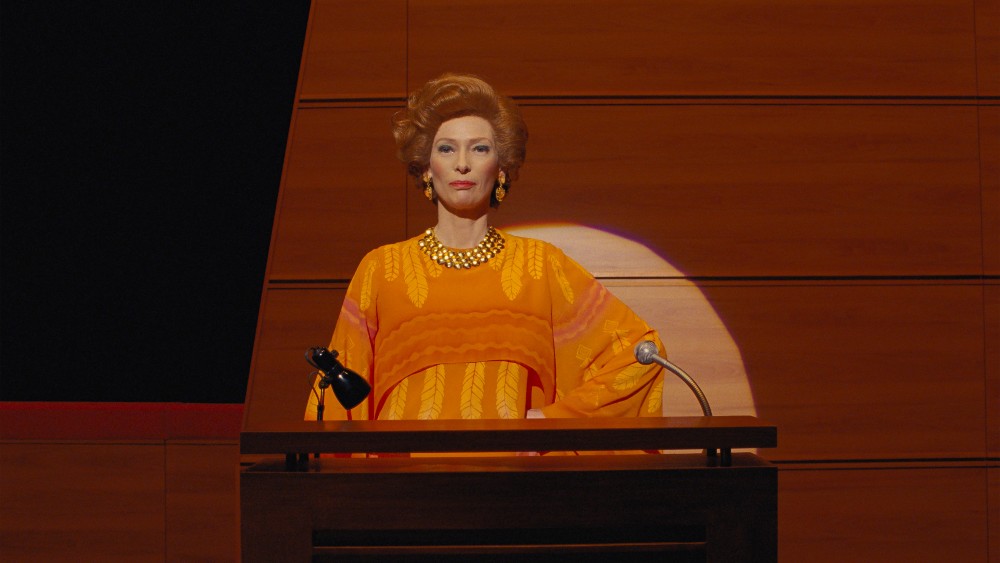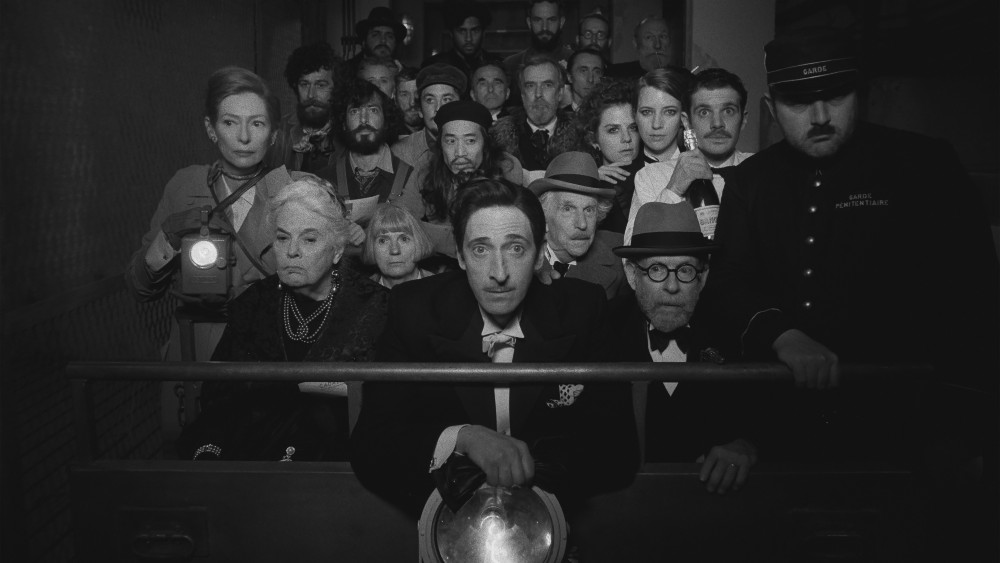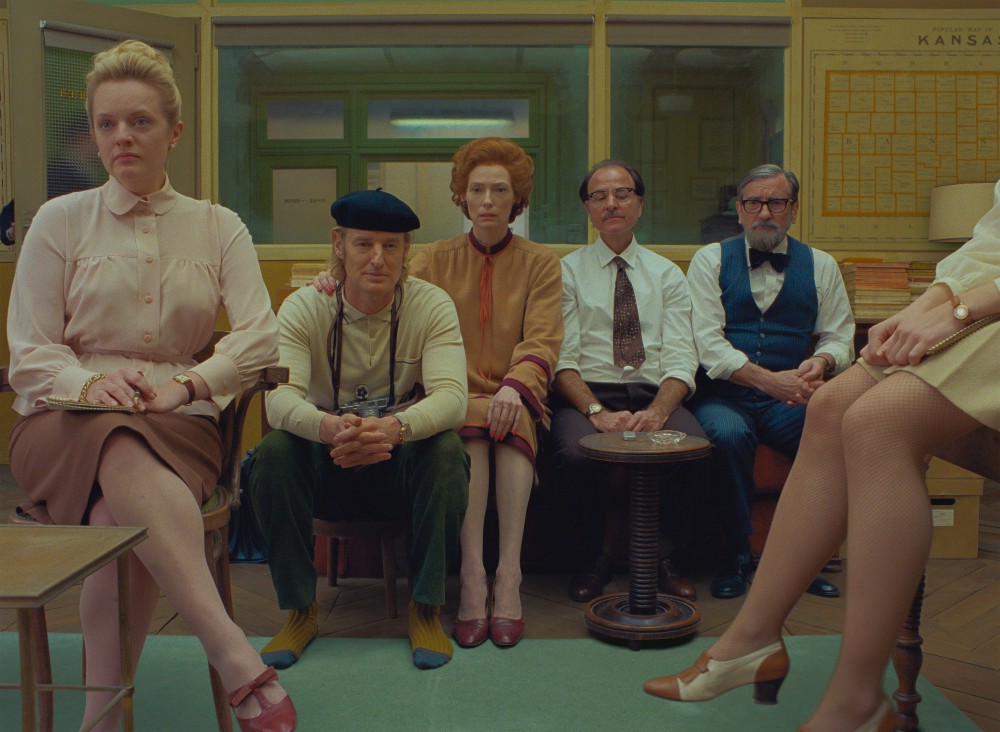
Of the currently active directors whose work is thematically and aesthetically recognizable, Wes Anderson stands out as the most vivid, perhaps even the most colorfully imaginative. Like many other auteurs who have achieved a cult following or risen too quickly in popularity, Anderson has also become a victim of his own undeniable talent. Obviously desperate to recapture that zeitgeist of originality that made The Royal Tenenbaums a watershed picture in movie history, Anderson has consumed himself in the complicated maze of his own imagination. The end result of his elaborate mind games is to keep his subsequent movies, including his latest, The French Dispatch, from making the elusive jump from good to great.
The French Dispatch features many of Anderson’s signature trademarks. The hulking cast spans the generations and repeats familiar players, including Bill Murray, Ed Norton, Adrien Brody, Owen Wilson, and Tilda Swinton, alongside other stars that have appeared in relatively fewer of Anderson’s many movies, such as Benicio del Toro, Jeffrey Wright, Timothee Chalamet, Frances McDormand, Lea Seydoux, and Steven Park.
The massive technical wizardry on display also revisit Anderson’s old collaborators, including Alexandre Desplat with another playful score (having won an Oscar for Anderson’s Grand Budapest Hotel), production design by Adam Stockhausen (another Grand Budapest Oscar winner), and cinematography and editing by Robert Yeoman and Andrew Weisblum (those last two are also frequent collaborators). The story, as usual written by Anderson, this time with Jason Schwartzman, is whimsical, sarcastic, lighthearted, and admittedly clever.

Too clever by half, as is so common with Anderson’s films. Start with the setup. Murray plays Arthur Howitzer, Jr., the editor of a magazine called The French Dispatch, which covers life in France for readers in Kansas. Howitzer runs his edition from the supposedly ingeniously-named fictional French town Ennui-sur-Blasé. Immediately, one wonders—does Anderson expect his audiences not to appreciate the meaning of the words? Or to understand them and find him very clever? And, if he assumes they know the meaning of those French words, does he really think the moniker is funny? Is one to assume that Monsieur Nonchalant is the mayor of Ennui-sur-Blasé?
For the uninitiated, ennui means roughly “boredom,” and “blasé” means unimpressed, disinterested. Disinterested boredom is obviously not what Anderson is going for with The French Dispatch, or with anything else he does. Surely sarcasm must be the answer, because if Anderson is selling a world in which he does not care about whether he is perceived as being as smart as the erudite editor-in-chief of his fictional magazine — do not buy it. After all, Howitzer is openly based on Harold Ross, the storied founder and editor of The New Yorker. Anderson’s set-up joke is not playful sarcasm, it is know-it-all pretension.
Beyond the eyebrow-raising setup, the first two acts of Anderson’s new film will disarm you. Styled as a voice-over narration of the various articles in Howitzer’s magazine’s last number, or perhaps as a love song to journalism, The French Dispatch at first exhibits a level of sophistication that is not typical of Anderson’s juvenile screenplays. In the first act, an eccentric, corrupt art dealer played by Brody cons the world into thinking that the jumbled paintings of a deranged prison inmate played by Del Toro (made thanks to nude posing by a prison guard played by Seydoux), are valuable. In the second, a group of idealistic, Bohemian students led by the admittedly blasé-looking Chalamet, take up arms against university establishments.

Both of these stories, as well as the third and last, are told through the eyes of the journalists that cover their respective sections of the magazines. The art story is told by one J.K.L. Berensen (Swinton), an over-dramatic writer and art collector whose prose is always late and perspective always untrustworthy. The student story is told by a “grammar nazi” with a penchant for meticulous punctuation and a disdain for unnecessary adverbs and adjectives, one Lucinda Krementz (McDormand). Both set-ups are amusing, and both stories and entertaining enough. Even better, though, unlike most of Anderson’s post-Tenenbaums work, these parts of The French Dispatch achieve something remarkable: to have a point. The point is to show the filmmaker’s cynicism and disdain for the idealistic people his journalists examine—the artists, the dealers, the principled-students. Their ideals are just shams, Anderson posits, they are all just horny. To the extent that critique is made self-referential through the supposedly subtle name of the town the magazine is set in, the self-awareness is welcome and, again, uncharacteristic.
Just as The French Dispatch is hitting its stride, the third act steps in to ruin it all. In that one, a food critic (Jeffrey Wright) covers the kidnapping of a prominent politician’s kid through the lens of supposed culinary interest. The set-up does not work, and any pretense of playfully disparaging an idealistic pursuit is abandoned. This is Anderson running on fumes, failing to stick the landing, to the great detriment of what to that point was a wildly effective picture.

At least the last act, like the first two, remains delightful to watch, with Anderson using black-and-white splices to a considerable extent. His camerawork, with the assistance of DoP Yeoman, has become more adept not just as showcasing his bright colors, but at transitioning between panels that represent the different moments of the various stories. The cinematography, moreover, goes hand in hand with Weisblum’s edits, a sorely needed guide to keep you afloat in the drowning waters of Anderson’s increasingly tangled plot twists and turns. And Stockhausen delivers arguably the best decorated set of his career. Unlike in some of Anderson’s other movies, mostly one tone in setting, The French Dispatch by its very nature spans different settings (a prison, a school, a police station), requiring much deeper production design, which Stockhausen delivers.
The French Dispatch, like so many other Wes Anderson films, is a good movie, not a great one. Its “great” aspects–mostly the below-the-line efforts–are truly so. Its most important aspects, like the story–to which the director devoted so much effort–are truly great until they are not, collapsing the entire building under its own weight. The end result will certainly not be ennui–the film will entertain you–but very well may leave you feeling blasé about the director’s latest offering.
Grade: B
The French Dispatch premiered at the Cannes and Telluride Film Festivals and will be released by Searchlight Pictures in U.S. theaters on October 22.





